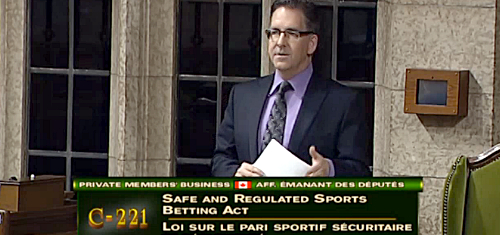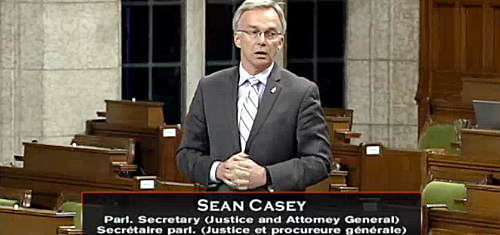 Canada’s push for single-game sports betting took a hit on Tuesday after the ruling Liberal party announced it would oppose the measure.
Canada’s push for single-game sports betting took a hit on Tuesday after the ruling Liberal party announced it would oppose the measure.
On Tuesday, Canada’s House of Commons held the second (of three) readings of Bill C-221, aka the Safe and Regulated Sports Betting Act, which would amend a single section of Canada’s criminal code to allow provinces and territories to decide whether to permit single-game sports wagers within their borders.
C-221 received a passionate introduction by its sponsor, New Democratic Party MP Brian Masse (pictured), whose voice was a little hoarse – which, in typical Canadian fashion, he blamed on having spent the previous day yelling at the youth hockey team he coaches – but whose oratory made sure his fellow MPs understood the opportunity at hand.
Masse repeated many of his earlier arguments in support of his private member’s bill, in particular the fact that single-game wagering is already taking place. Masse’s own research found that a Google search of ‘Canadian sports betting sites’ turns up around 530k hits.
Masse also took a shot at the National Hockey League, which was among the professional sports leagues that expressed opposition to C-221’s predecessor (C-290) when that bill came up for debate in Canada’s Senate (before dying on the order paper).
Masse noted that the NHL website had a direct link to daily fantasy sports operator DraftKings, a connection Masse claimed had “reined in” the league’s ability to get sanctimonious about the alleged threat betting posed to game integrity.
 NOT SO FAST, SAY LIBERALS
NOT SO FAST, SAY LIBERALS
But Masse’s desires ran headlong into a rebuttal from Sean Casey, Liberal MP for Charlottetown, PEI and the Parliamentary Secretary to the Minister of Justice and Attorney General of Canada.
Casey began by noting that the major professional sports leagues’ objections to C-290 were based on their fears of single-game sports betting’s potential effect on game integrity. Casey surprised many onlookers by saying that the ruling Liberals “shared these same concerns.”
Casey claimed that Canada’s existing parlay sports betting market was a real problem for match-fixers, while single-game wagers “would make a fraudster’s task easier.” Casey concluded that the government “should oppose legislation that may significantly affect this integrity.”
Casey then opined that individual provinces might gain financially from single-game wagering, but “at what cost, specifically, at what social cost?” Casey recited stats showing that while low income Canadians were less likely to gamble, they were more likely to experience gambling problems when they did gamble.
Casey claimed that low-income Canadians who currently place single-game wagers with bookmakers other than the provincial lottery corporations would likely continue to wager with these operators even if C-221 passed. Casey claimed this was because of “easy access to credit, convenience and better odds.”
(The latter two categories most definitely apply to the internationally licensed online operators currently serving the needs of Canadian sports bettors, but credit is only available via the back-of-the-bar bookie.)
Based on these arguments, Casey said “opposing this bill means protecting our most vulnerable citizens,” and argued that the potential financial benefits to the provinces were “clearly not strong enough to rationalize supporting this bill.”
Casey summed up by saying C-221’s passage would lead to “more gambling and will contribute to the many ills to society brought about by problem gambling.” Casey urged Liberal MPs – who constitute a clear majority in the House of Commons – to vote against the bill.
TORIES PROMISE FREE VOTE, NDP SAYS INTERNATIONAL OPERATORS WANT IN
By contrast, Gordon Brown, the Tory MP for Leeds-Grenville, Ontario and chief opposition whip, spoke out in favor of C-221 and said his party would allow a free vote on the issue. Brown said single-game wagering would give Canadian casinos a competitive edge over their American counterparts and would give tourism a badly needed boost.
Some of Masse’s fellow NDP MPs also spoke in support of C-221, including Matthew Dubé (Beloeil-Chambly, Quebec), who wondered why the Liberals, who had supported C-290 when they were in opposition, were opposed to C-221. Dubé urged Liberal backbenchers to “use their common sense” rather than vote the party line.
Another NDP’er, Cheryl Hardcastle (Windsor-Tecumseh) mentioned that there were many “legitimate, multinational sports betting operations catering to Canadian clients on the internet who want to operate in a clearly defined, regulated environment.”
Hardcastle closed her remarks by saying C-221 would cost the government nothing and would generate considerable revenue for provinces, making this “a safe bet indeed.” Just not a very good bet, given the Liberal objections.
